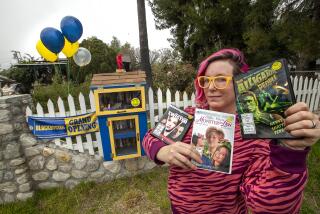Public TV Heading to the Malls : Television: With its soon-to-open Store of Knowledge at Glendale Galleria, KCET is seeking an alternative route for raising needed funds.
Consider it public television’s war of the stores.
In this corner, on the main floor of Beverly Center, just a book’s throw from the center elevators, is Learningsmith. In the other corner at Glendale Galleria, on the ground level between Lady Foot Locker and the Gap, is Store of Knowledge--the one with the huge see-through globe out front, with KCET in big blue letters.
Store of Knowledge is KCET-TV Channel 28’s new 4,500-square-foot venture in retail, while Learningsmith, a tad smaller, belongs to Boston’s WGBH-TV, home of “Frontline” and “Masterpiece Theatre.”
So here they are, two major public-TV stations, a bit awkwardly squaring off like two supermarkets on facing corners.
*
Why? For William H. Kobin, KCET’s president, it’s as simple and necessary as finding alternative methods of fund-raising when the traditional sources are no longer adequate.
Retail is “an absolute natural” for public TV, Kobin insists. “I don’t think it’s an odd concept at all because our mission is ‘lifelong learning.’ And these stores are dedicated to lifelong learning. When you look through (our merchandise) folder, you’ll see there are items for absolutely every age, and every item in this store is a learning item.”
Besides, KCET considers it a no-lose proposition since it can only make money. According to Kobin, “not a dollar” of station money is going toward the store. Instead, he said, the station is supplying its “good name,” plus the ability to attract other public stations to similar ventures elsewhere. Like Learningsmith, Store of Knowledge is promising to go national.
Carson-based Lakeshore Learning, a longtime supplier of educational materials for schools and youth organizations, is one of KCET’s partners in the Store of Knowledge’s triumvirate. The other is the Los Angeles venture capital firm Riordan, Lewis and Haden.
Kobin and Michael Kaplan, president of the KCET store and chairman of Lakeshore Learning Materials, said that Riordan, Lewis and Haden is putting up the money--they decline to say how much--while Lakeshore Learning is providing the merchandise, the warehousing and the computers.
Although the official opening of KCET’s store is April 7, it may quietly open Friday or over the weekend, or early next week, “or, God forbid, April 7,” quipped Kaplan.
Store’s inventory, designed to attract customers from preschoolers (and their parents) to adult computer whizzes, will range from books, games, puzzles, public-TV videocassettes and a host of CD-ROMs to cardboard “bug boxes” at $12.95, which are said to educate as well as scare those who open them.
Competition with Learningsmith is inevitable because there will be some overlap in both educational and PBS products. The first Learningsmith opened in 1991 and there are now 15 nationwide; Los Angeles’ arrived last November.
Kobin professes a laid-back view of the competition: “I think the more interest there is in items of this kind and the more places there are, the better off we’ll all do.”
Karen Johnson, director of product merchandise at WGBH, said that KCET was asked two years ago to join in WGBH’s retail venture and receive royalties, but declined. “There’s a difference between a royalty and an ownership,” Kobin said, explaining why the Store of Knowledge arrangement is better for KCET.
Kaplan said new Stores of Knowledge will open this summer at Santa Monica Place and at Montclair Plaza in Montclair. Learningsmith will open a new branch in Orange County’s South Coast Plaza in June.
Timothy B. Conroy, KCET’s senior vice president for marketing and business development, said eight more stores are being planned in California and across the nation in 1995. He declined to say where, but noted that Channel 28 and its partners would share in those profits too, along with other public-TV stations in each particular city.
“Public television has an interesting double-barreled mandate,” Kobin said. “One is to stay true to the mission, and the other is the need to become self-supporting. The standard, the traditional, the classic methods of fund-raising are not going to be enough to sustain us for the future. So it’s absolutely essential we develop new sources of revenue . . . which in other words means profit , to stay alive.”
More to Read
Inside the business of entertainment
The Wide Shot brings you news, analysis and insights on everything from streaming wars to production — and what it all means for the future.
You may occasionally receive promotional content from the Los Angeles Times.










